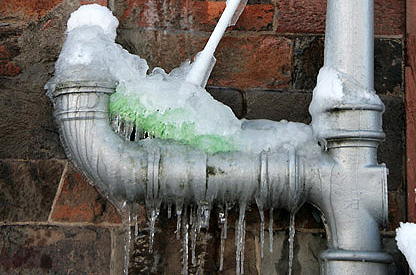Protecting Against Frozen Pipes: Effective Tips for Winter
Protecting Against Frozen Pipes: Effective Tips for Winter
Blog Article
They are making a few great points relating to How to Prevent Your Pipes From Freezing overall in this great article beneath.

Winter can damage your pipes, especially by freezing pipes. Right here's exactly how to prevent it from happening and what to do if it does.
Intro
As temperature levels decrease, the danger of frozen pipelines rises, potentially bring about pricey repair services and water damage. Recognizing how to stop frozen pipes is critical for house owners in cool climates.
Comprehending Icy Pipelines
What causes pipes to freeze?
Pipes ice up when revealed to temperatures listed below 32 ° F (0 ° C) for extended periods. As water inside the pipelines ices up, it increases, taxing the pipe wall surfaces and potentially causing them to rupture.
Risks and problems
Frozen pipes can lead to water interruptions, property damages, and expensive repair work. Burst pipes can flood homes and create comprehensive architectural damage.
Signs of Frozen Water Lines
Determining icy pipes early can prevent them from bursting.
How to identify frozen pipes
Look for lowered water circulation from taps, uncommon odors or noises from pipes, and noticeable frost on revealed pipes.
Prevention Tips
Insulating at risk pipes
Wrap pipelines in insulation sleeves or make use of warm tape to protect them from freezing temperature levels. Focus on pipes in unheated or external areas of the home.
Heating strategies
Keep indoor areas adequately warmed, particularly areas with pipes. Open up cupboard doors to permit warm air to flow around pipes under sinks.
Shielding Outside Pipes
Garden pipes and outdoor faucets
Detach and drain yard hoses prior to winter season. Install frost-proof faucets or cover outside taps with protected caps.
What to Do If Your Pipelines Freeze
Immediate actions to take
If you suspect icy pipelines, maintain faucets open to alleviate pressure as the ice thaws. Utilize a hairdryer or towels soaked in hot water to thaw pipes slowly.
Long-Term Solutions
Structural adjustments
Think about rerouting pipes away from outside walls or unheated areas. Add added insulation to attic rooms, basements, and crawl spaces.
Updating insulation
Buy top notch insulation for pipes, attic rooms, and walls. Proper insulation aids maintain regular temperatures and reduces the danger of frozen pipelines.
Verdict
Preventing frozen pipelines calls for positive measures and quick actions. By recognizing the causes, indications, and safety nets, homeowners can safeguard their pipes throughout cold weather.
5 Ways to Prevent Frozen Pipes
Drain Outdoor Faucets and Disconnect Hoses
First, close the shut-off valve that controls the flow of water in the pipe to your outdoor faucet. Then, head outside to disconnect and drain your hose and open the outdoor faucet to allow the water to completely drain out of the line. Turn off the faucet when done. Finally, head back to the shut-off valve and drain the remaining water inside the pipe into a bucket or container. Additionally, if you have a home irrigation system, you should consider hiring an expert to clear the system of water each year.
Insulate Pipes
One of the best and most cost-effective methods for preventing frozen water pipes is to wrap your pipes with insulation. This is especially important for areas in your home that aren’t exposed to heat, such as an attic. We suggest using foam sleeves, which can typically be found at your local hardware store.
Keep Heat Running at 65
Your pipes are located inside your walls, and the temperature there is much colder than the rest of the house. To prevent your pipes from freezing, The Insurance Information Institute suggests that you keep your home heated to at least 65 degrees, even when traveling. You may want to invest in smart devices that can keep an eye on the temperature in your home while you’re away.
Leave Water Dripping
Moving water — even a small trickle — can prevent ice from forming inside your pipes. When freezing temps are imminent, start a drip of water from all faucets that serve exposed pipes. Leaving a few faucets running will also help relieve pressure inside the pipes and help prevent a rupture if the water inside freezes.
Open Cupboard Doors
Warm your kitchen and bathroom pipes by opening cupboards and vanities. You should also leave your interior doors ajar to help warm air circulate evenly throughout your home.

I am just very taken with Helpful Tips to Prevent Frozen Pipes this Winter and I hope you appreciated our blog posting. Those who liked our blog post plz remember to pass it around. Thanks a lot for your time invested reading it.
Visit My Web Page Report this page